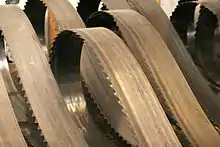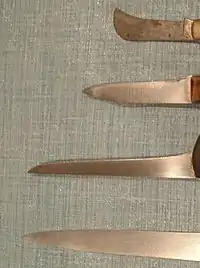blade
English


Etymology
From Middle English blade, blad, from Old English blæd (“leaf”), from Proto-West Germanic *blad, from Proto-Germanic *bladą, from Proto-Indo-European *bʰl̥h₃-o-to-m, from *bʰleh₃- (“to thrive, bloom”).
See also West Frisian bled, Dutch blad, German Blatt, Danish blad, Irish bláth (“flower”), Welsh blodyn (“flower”), Tocharian A pält, Tocharian B pilta (“leaf”), Albanian fletë (“leaf”). Similar usage in German Sägeblatt (“saw blade”, literally “saw leaf”). Doublet of blat. More at blow.
Pronunciation
- enPR: blād, IPA(key): /bleɪd/
Audio (US) (file) - Rhymes: -eɪd
Noun
blade (plural blades)
- The (typically sharp-edged) part of a knife, sword, razor, or other tool with which it cuts.
- 1904, Great Britain. War Office, Dress Regulations for the Officers of the Army (including the Militia): 1904, page 100:
- Sword. — The blade is straight, tapers gradually, is 32 9/16 inches long from shoulder to point, and is fullered on both sides, commencing 2 inches from the shoulder, to about 17 inches from the point, to a thickness of ·035 inch.
- (metonymically) A sword or knife.
- 1984, 2:08:29 from the start, in Dune (Science Fiction), →OCLC:
- Paul: Give the Harkonnen a blade and let him stand forth.
Shaddam IV: If Feyd wishes, he can meet you with my blade in his hand.
- Short for razor blade.
- The flat functional end or piece of a propeller, oar, hockey stick, chisel, screwdriver, skate, etc.
- 2013 July-August, Lee S. Langston, “The Adaptable Gas Turbine”, in American Scientist:
- Turbines have been around for a long time—windmills and water wheels are early examples. The name comes from the Latin turbo, meaning vortex, and thus the defining property of a turbine is that a fluid or gas turns the blades of a rotor, which is attached to a shaft that can perform useful work.
- The narrow leaf of a grass or cereal.
- (botany) The thin, flat part of a plant leaf, attached to a stem (petiole). The lamina.
- A flat bone, especially the shoulder blade.
- A cut of beef from near the shoulder blade (part of the chuck).
- (chiefly phonetics, phonology) The part of the tongue just behind the tip, used to make laminal consonants.
- (archaeology) A piece of prepared, sharp-edged stone, often flint, at least twice as long as it is wide; a long flake of ground-edge stone or knapped vitreous stone.
- (ultimate frisbee) A throw characterized by a tight parabolic trajectory due to a steep lateral attitude.
- (sailing) The rudder, daggerboard, or centerboard of a vessel.
- A bulldozer or surface-grading machine with mechanically adjustable blade that is nominally perpendicular to the forward motion of the vehicle.
- (dated) A dashing young man.
- 1834 [1799], Samuel Taylor Coleridge, Robert Southey, “The Devil's Thoughts”, in The Poetical Works of S. T. Coleridge, volume II, London: W. Pickering, page 85:
- He saw a Turnkey in a trice / Unfetter a troublesome blade;
- 1832, The Universal Songster: Or, Museum of Mirth, page 189:
- But very often blust'ring blades / Are Jerry Sneaks at home.
- 1948, Jack Lait, Lee Mortimer, New York: Confidential!, Crown, published 1951, page 94:
- Vice does not thrive here, because the young blades seek it elsewhere.
- 2009, Amanda Vickery, Behind Closed Doors, Yale University Press, page 77:
- Young blades were expected to kick over the traces and skirt disaster, before they graduated to matrimonial housekeeping.
- (slang, chiefly US) A homosexual, usually male.
- (slang, chiefly US) An area of a city which is commonly known for prostitution.
- Thin plate, foil.
- (photography) One of a series of small plates that make up the aperture or the shutter of a camera.
- (architecture, in the plural) The principal rafters of a roof.[1]
- (biology) The four large shell plates on the sides, and the five large ones of the middle, of the carapace of the sea turtle, which yield the best tortoise shell.[2]
- (computing) Short for blade server.
- (climbing) Synonym of knifeblade
- (mathematics) An exterior product of vectors. (The product may have more than two factors. Also, a scalar counts as a 0-blade, a vector as a 1-blade; an exterior product of k vectors may be called a k-blade.)
- Holonym: multivector
- The part of a key that is inserted into the lock.
- Coordinate term: bow
- (athletics, informal) An artificial foot used by amputee athletes, shaped like an upside-down question mark.
- Coordinate terms: bladerunner, blade jumper, leaf spring
- (uncountable, music) The quality of singing with a pure, resonant sound; especially of a countertenor.
- He wasn’t loud, but his voice had lots of blade.
Derived terms
- axeblade
- blade of grass
- blade connector
- blade server
- blade sharpener
- bladeless
- bladelet
- bladelike
- blade-out
- bladesmith
- bladerunner
- blade jumper
- blisk
- blucket
- doctor blade
- fan blade
- gay blade
- microblade
- oar blade
- oyster blade, oyster blade steak
- razor blade, razor-blade, razorblade
- rollerblade
- shoulder blade, shoulderblade, shoulder-blade
- snowblade
- switchblade
- twayblade
Translations
|
|
|
|
|
|
- The translations below need to be checked and inserted above into the appropriate translation tables. See instructions at Wiktionary:Entry layout § Translations.
References
- 1849-1850, John Weale, Rudimentary Dictionary of Terms used in Architecture, Building, and Engineering
- 1880, Leo de Colange, The American Dictionary of Commerce […]
Verb
blade (third-person singular simple present blades, present participle blading, simple past and past participle bladed)
- (informal) To skate on rollerblades.
- Want to go blading with me later in the park?
- (transitive) To furnish with a blade.
- (intransitive, poetic) To put forth or have a blade.
- 1633, Phineas Fletcher, “Elisa”, in Piscatorie Eclogues and other Poetical Miscellanies:
- As sweet a plant, as fair a flower, is faded / As ever in the Muses' garden bladed.
- (transitive) To stab with a blade
- The gang member got bladed in a fight.
- (transitive, professional wrestling, slang) To cut (a person) so as to provoke bleeding.
Derived terms
- hydroblade
Translations
References
Dutch
Etymology
Borrowed from English blade, from Middle English blade. Doublet of blad.
Pronunciation
- IPA(key): /bleːd/
- Hyphenation: blade
Middle English
Etymology
From Old English blæd, from Proto-West Germanic *blad, from Proto-Germanic *bladą, from Proto-Indo-European *bʰl̥h₃otom.
Pronunciation
- IPA(key): /blaːd/, /blad/
Noun
blade (plural blades or bladdys)
- A leaf or blade; a piece foliage in general.
- A blade (sharp edge of a weapon).
- Any sharp-bladed slashing or stabbing weapon.
- (rare) A wooden tile or chip for roofing.
- (rare) Anything close in appearance or form to a blade.
References
- “blā̆d(e, n.”, in MED Online, Ann Arbor, Mich.: University of Michigan, 2007, retrieved 2018-06-29.
Polish
Pronunciation
- IPA(key): /ˈbla.dɛ/
- Rhymes: -adɛ
- Syllabification: bla‧de
Adjective
blade
- inflection of blady:
- neuter nominative/accusative/vocative singular
- nonvirile nominative/accusative/vocative plural